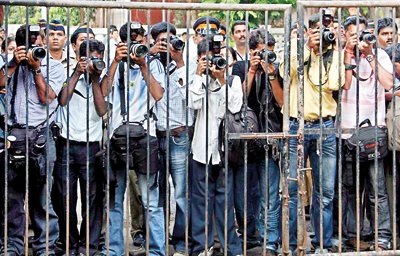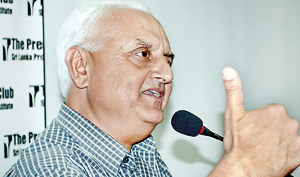Sunday Times 2
Regulating journalism won’t cure problems that ail the press
NEW DELHI (Reuters) – Editors say headlines should catch the eye. I’m one of those editors who says things like that. Here is one from CNN-IBN that caught my eye: “Editors call for media regulation after arrest of Zee News journalists.” Why would they ever want that?
We call those “man bites dog” headlines because they’re unusual, and that makes them news. Journalists are supposed to resist government attempts to control the way they do their jobs. If you make the government one of your minders, supervisors or shareholders, the argument goes, you compromise your journalists’ abilities to report on the government. If editors call for more regulation of themselves, no matter the country, this is the risk that they run.

Press photographers in Mumbai, India (Reuters)
Vinod Mehta, editorial chairman of the Outlook Group, which publishes Outlook magazine, was the editor quoted in the CNN-IBN article who said the press needs regulation. He said this in response to news that police arrested two Zee News editors after Congress Party parliamentarian and industrialist Naveen Jindal said they tried to extort money from him in return for not airing a negative story about his company.
“I think there is a very very serious need for external regulation. I think internal self regulation has failed and failed lamentably, at least television has your national broadcasters association. In the print media, we have absolutely nothing because all editors say that we don’t want external self regulation because we can do it ourselves. I’ve got a corrections page, I’ve got a clarifications page, and therefore, we don’t need it.”
It’s not surprising that Mehta would say this.
Outlook cracked open a scandal in 2009 in which a bunch of Indian newspapers charged politicians for coverage packages, not just positive coverage, but any coverage at all. If that’s not a kind of crime already – some kind of bribery would be my guess, or reverse blackmail (we ignore you if you don’t pay us) – there’s probably a way to make it fit a crime already listed in the books.
So, why regulate? What would the regulations do? My colleague in Delhi, Aditya Kalra, wrote that the proper set of regulations would curb arrogance and bad behaviour without restricting their freedom of speech or ability to report.
You can’t do one without the other. Establishing any government control over the press, however tenuous, means that politicians of varying beliefs, platforms, business relationships and attitudes toward the press can penalise journalists for infractions, or they can appoint people who will.
Look at the Press Council of India. Its chairman, former Supreme Court Justice Markandey Katju (whose writing on language I admire ) says that the council recognises no government influence. He also says, in the same essay, that three politicians appoint members of the council’s governing board. This council also has judicial power to decide cases that people bring against journalists for accusations of libel, defamation and more. That seems to constitute government regulation already, though one step removed from a bureaucrat’s desk.
Katju has been quoted at least twice in the past two weeks as saying that India’s press needs more regulation. He recently said , “There should be [a] reasonable amount of restriction on media freedom.” He also said that media freedom should be “crushed” under some circumstances. (Katju’s comments are all over the map if you read them. He talked about media freedom versus responsibiltiy here [11], and defended the same press freedom he spoke of crushing here )
In fact, laws against extortion, bribery, blackmail and other illegal acts should apply to anyone who commits them. Why make a new set that applies to one profession, the one that, conveniently enough, tries to expose bad behaviour among powerful people, if it’s doing its job properly?
What would the regulations that Katju and Vinod Mehta ask for look like? Who would enforce it? Under what legal power? What can journalists do? What can’t they do? Where do regulatory and enforcement powers end? Will journalists have to get a government-issued license? Will negative stories result in the suspension of licenses? These may be absurd questions now, but why open the door to that path?
Some of what motivates the antipathy toward journalists that would bring us to this stage is a sense that journalists and their editors – and their corporate managers – have it coming. Every Indian journalist I know has told me at least one story about watching their fellows use their press passes to score little, petty favours – cheaper beer at the bar, parking spaces reserved for VIPs – or use their positions to intimidate people into giving them what they want. You know the type: “You’d better give me X, or else I’ll ruin you with a negative story…”
Journalism, like most other professions, attracts its share of arrogant jerks. Some journalists are lazy, sycophantic, craven, robotic, vindictive, corrupt and dishonest. Some are guilty of nothing more than working for greedy, corrupt, pliable owners who use their editorial platform to highlight or ignore topics or people to suit their interests. Others care about the job they do and do it the best they can. Some tell you things that you need to know, and others can change people’s lives.
Allowing governments, whether central or state or local, to have a role, however small, in regulating how journalists do their jobs is the first step toward making sure that journalists commit the worst possible offences available to them: repeating, not reporting and pulling punches when they should hit harder.
Follow @timesonlinelk
comments powered by Disqus





















